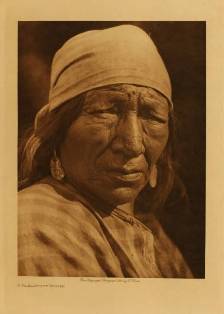Listen to this poem by pressing the play button above.

I am not an Indian
My great-great-great-great grandmother
was a full-blooded Blackfoot Indian.
People say full-blooded not because
they have any proof,
but because it sounds wild, native.
If you do the math, that makes me
1.5% Blackfoot, and not very wild at all.
Say what you will about Ward Churchill;
he was right that all our accomplishments
as a country, all our technology, all our freedom,
all our music and poetry and art and dance and theater,
is being created on land that we stole from people
whose names we don’t even remember.
In college, my roommate’s best friend
paid less for his tuition because he was
above some arbitrary threshold
of Native American ancestry.
Not full-blooded, but bloody enough.
He was generously allowed
to learn quote-history-unquote
in a government building on the very land
his ancestors occupied before they became
little more than discount coupons for the state.
Another branch of my family has lived
in New England since 1638.
We never owned slaves, you’ll hear them
attest proudly, and it appears to be true.
Less lauded is my some-number-of-greats
uncle John Flanders, who served
with distinction in the army of Gen. John Sullivan,
helping to rid upstate New York of the Iroquois.
Sullivan’s troops burned and shot and hung and scattered
the people of many nations, including the Cayuga.
The army destroyed their town of Coreorgonel, and in its place was
established Ithaca, now a haven for higher education and
an oasis for studiers of organic farming and
Native American spirituality.
Living at Coreorgonel were the remnants of the Tutelo people,
who’d been forced from their homes
on the border of West Virginia and Kentucky,
and who were taken in by the Cayugas. It has been
112 years since any human being spoke the Tutelo language.
Sitting on a stage at the Tokyo Film Festival, director Chris Eyre
(of the Cheyenne-Arapaho, remember them?)
was asked by a member of the audience whether he preferred
to be called “Indian” or “Native American.”
“We have so many other problems to deal with
that we don’t have much time to worry about
what we’re called,” he said.
[…] I went next, reading a new poem, “The Last Piece Of Ice Under The Sky†along with “I Am Not An Indian.†[…]
I have more and closer native ancestry ‘from the northern part of the New York tribe’ according to my cousin’s yellowing typescript handed on from some early 20th century ancestor.(Presumably some type of Iroquois.) I have never got any brownie points for being Indian, English, Episcopalian, or any of the ethno-religious identifications for which Americans get brownie points,but I am really angry today about the Declaration of Independence calling my ancestors ‘merciless savages.’ Copies of the D of I are showing up on the internet today in writing too small to read. If you google it, you can read the whole bloody thing.
[…] After about 4 hours on the road, I made it to 86W, where there were signs regarding two kinds of rattlesnakes. I have a family connection to the latter kind, as my great-great-etc uncle John Flanders fought in Sullivan’s army. I addressed this in my poem “I Am Not An Indian.”. […]
[…] “I Am Not An Indian” […]